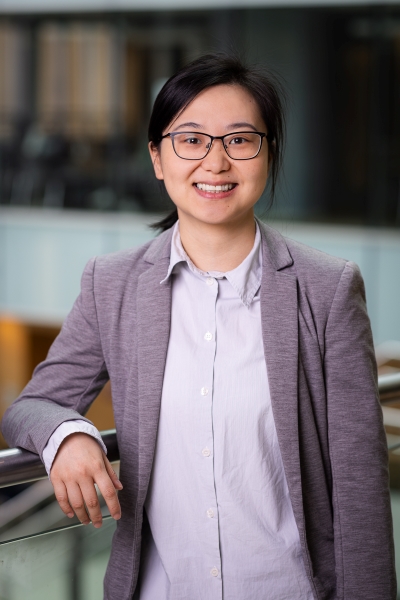School of Engineering (SoE) Faculty Spotlight
Dr. Qian Chen, Assistant Professor of Civil Engineering
UBCO School of Engineering
Website: School Profile
Why did you decide to study engineering?
I feel engineering is a direct platform to make a meaningful impact on society.
My grandfather, who worked as a cargo train driver for over 30 years, plays an important role in shaping my perspective on engineering. When I started primary school, he always mentioned to me the value of paying attention to details by giving rail operating examples to ensure safety and efficiency. This advice has stayed with me throughout my journey as a construction engineer and researcher – dealing with construction work that requires precision and quality.
I chose construction engineering because it has a positive job outlook considering the significant housing and infrastructure demands around the world.
Tell us about your research. How do you do this research?
My research focuses on using digital and immersive technologies, optimization algorithms, and fabrication-aware design methods to transform construction projects digitally.
Since I joined UBCO, I have been leading the Construction Integration and Digitalization (CID) lab which envisions to develop systematic digital and automation solutions to tackle the problems about construction stakeholder fragmentation and wastes across different project stages. For example, we have been collaborating with the Off-site Construction Research Centre of University of New Brunswick in designing and testing an integrated information flow between parametric building designs and robotic fabrication platforms.
This work has also been supported by international collaborators such as Dr. Charmaine Ng from Kyoto Institute of Technology, as we have been considering applying the best practices from Japanese industrial construction to the Canadian building context. The outcome of this research would help construction engineers, architects and manufacturers exchange information (e.g., design and fabrication of a wall panel) more efficiently and potentially reduce rework.
Incorporating industry and community partners’ insights into our research is also essential for demonstrating the practicality of our research outcomes. For example, through the Build Better Cluster led by Dr. Lisa Tobber, we are able to connect our research ideas with BC Housing to identify potential pilot projects to alleviate the housing affordability issues in BC.
Why is your research important?
Most of us have heard that construction generates about one-third of all waste globally and traditional construction methods can be slow and prone to errors due to its nature of complexity in work coordination and stakeholder fragmentation. That’s where my research steps in and we want to achieve quite a few goals such as cutting down on wasted materials, speeding up construction timelines, and ultimately making buildings more affordable for everyone.
By leveraging the power of digital tools and smart computer programs, we can make it possible for the industry to design and build housing or large infrastructure projects much faster, cheaper, on-quality and even waste-free, ultimately benefiting everyone in the communities.
What courses do you teach?
My courses at UBCO campus include undergrad courses ENGR330 Reliability and Risk Analysis for Civil Engineering and ENGR 433 Construction Engineering Management, an a cross-listed one ENGR 409/APSC509 Construction Digitalization and Informatics.
How does your research influence your teaching?
My research substantially enriches the learning experience for the undergrad and grad students in my classes by bridging the gap between theory and practice, particularly equipping them with the skills and knowledge needed to keep up with the evolving field of construction digitalization. For example, I have included advanced technological demos (e.g., Leica laser scanners, VR and AR glasses) in my ENGR 409/APSC509 Construction Digitalization and Informatics course where students can directly get hands-on experience with the same tools and techniques that researchers and practitioners have been exploring at the frontiers. I also feel this is an important way to prepare our students as future engineers with new skills required in the industry.
June 23 is International Day of Women in Engineering.
Do you have reflections on women in engineering?
Any women in engineering who inspire(d) you?
Any advice for women looking to pursue a career in Engineering?
As we celebrate International Day of Women in Engineering, I find it crucial to reflect on the invaluable contributions of women in the civil and construction engineering field. During my doctoral study, I was very lucky to be part of the Fix The Leaky Pipeline (female scientist and engineer mentoring) program and had the privilege of being guided and inspired by my mentor, Dr. Eleni Chatzi, the Chair of Structural Mechanics at ETH Zurich. One of the most important lessons I’ve learned from Dr. Chatzi, while my first journal article submission was rejected, is the importance of resilience and perseverance in the face of adversity. She shared with me the stories of her own journey and the obstacles she managed along the way, which is a valuable source of inspiration for me.
For women in engineering, my advice is simple: never underestimate your strengths and capabilities. Our underrepresented and female students should be always supported to lead the research project to present research work, apply for various awards (e.g., Best Paper Awards) and funding/scholarship opportunities, though engineering field is still male-dominated. It would be helpful to continuously promote the Women in Engineering mentorship programs on campus so we have the opportunity to connect our female students with positive role models and so they know change and advancement are attainable.
Anything else you want to share?
I’m excited about all the possibilities at School of Engineering that will help level up our female engineering students and I am happy to take the journey of discovery and innovation with all my students and colleagues together.